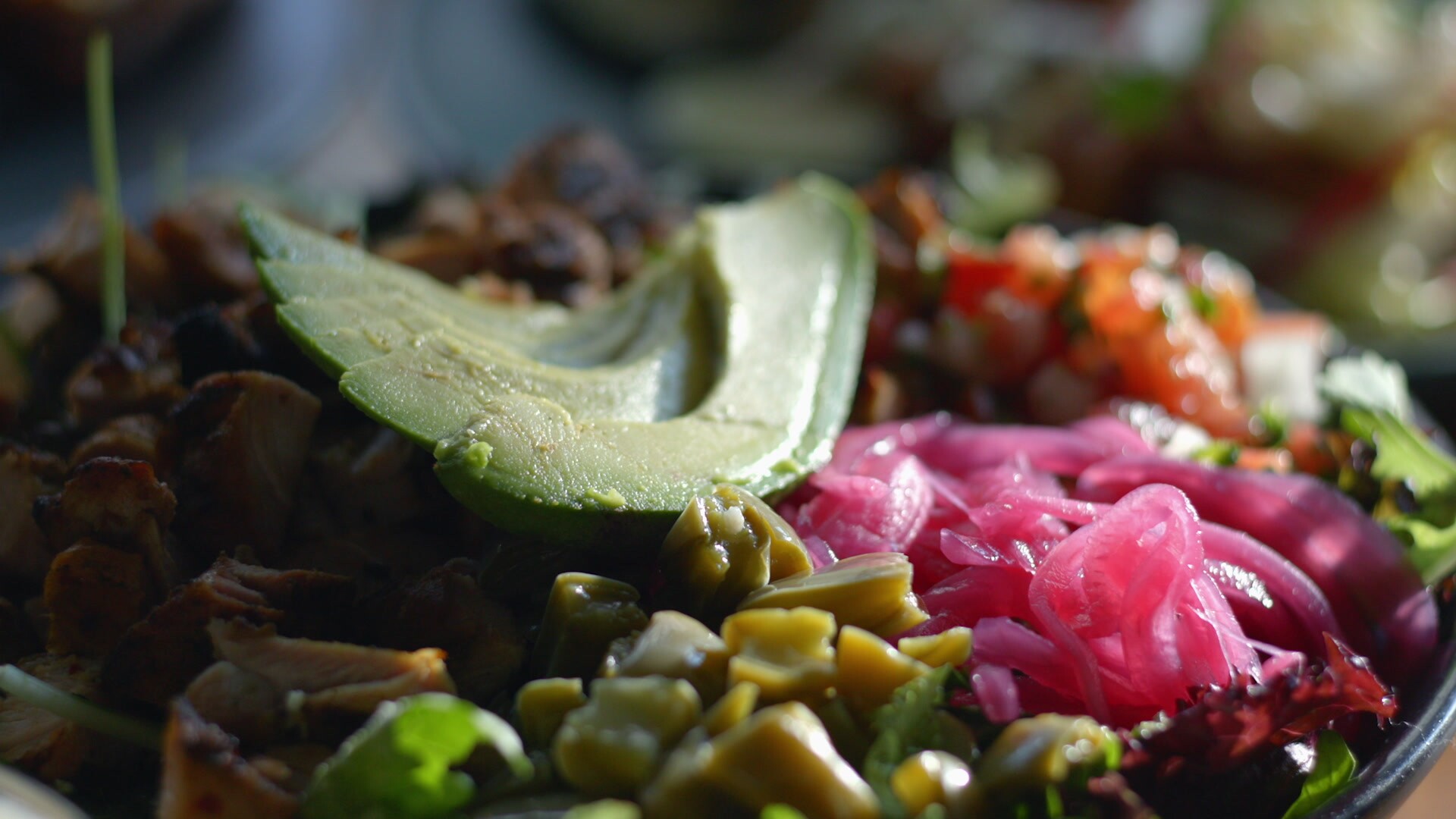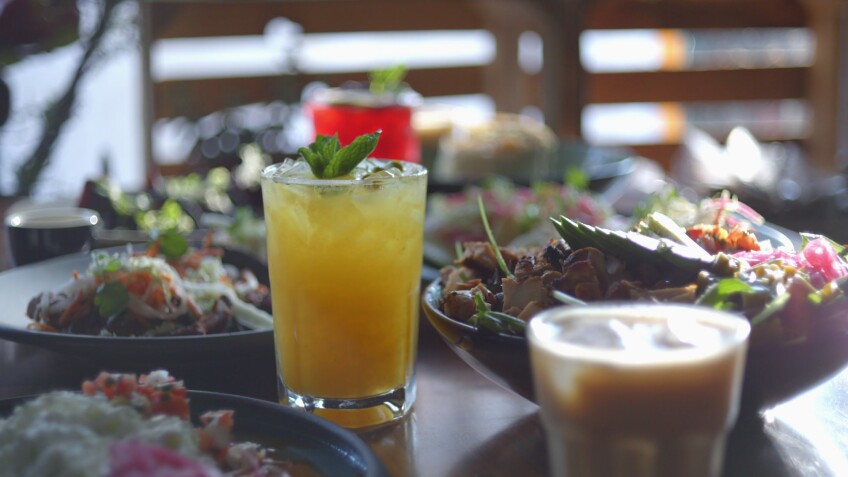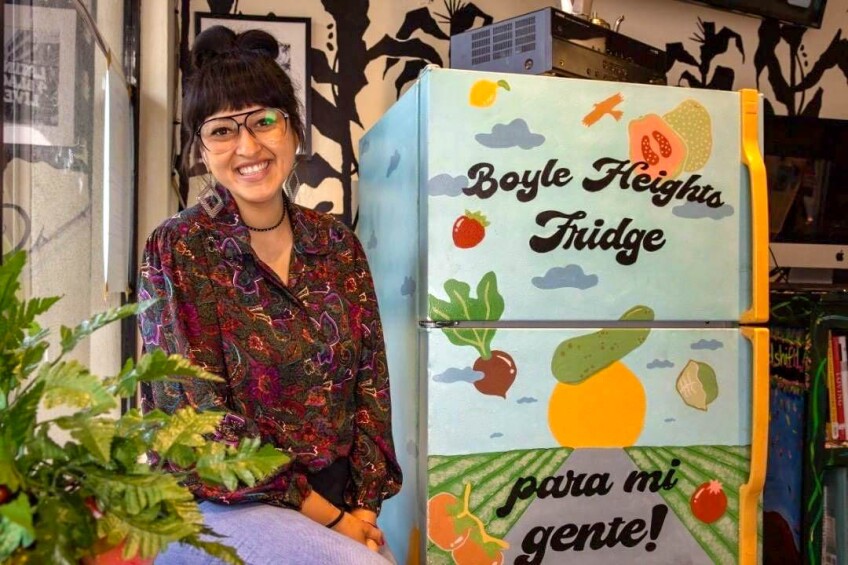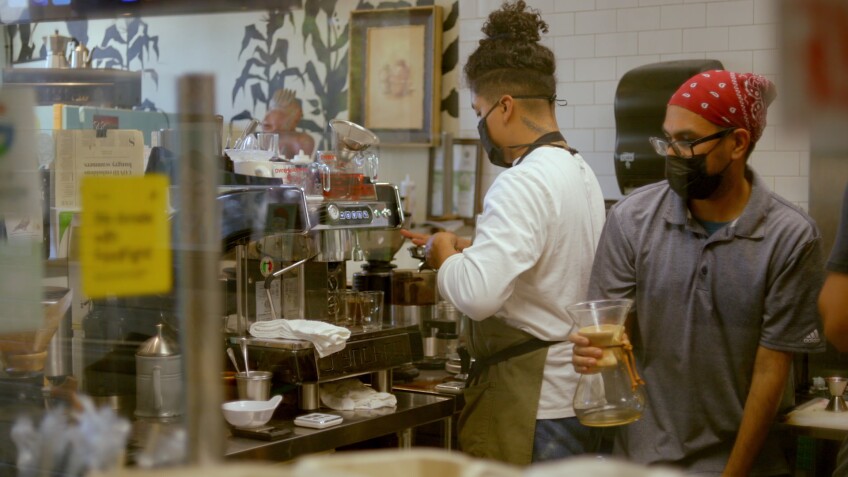
Boyle Heights’ Milpa Grille is Keeping Mesoamerican Traditions Alive in L.A.
If you spend any time in Boyle Heights, especially in the vicinity of Mariachi Plaza, you’ve probably spotted Deysi Serrano’s friendly face — her dark hair swept into a bun, eyes twinkling behind glasses — beaming at you from the corner of First Street and Boyle Avenue.
Serrano, the owner of the fast-casual, Mesoamerican-inspired restaurant, Milpa Grille, was one of a handful of neighborhood luminaries selected to appear in the “Somos Boyle Heights” mural that artists Levi Ponce and Marlene Solorio painted on the side of Cerda’s Upholstery Shop last year as part of a DoorDash marketing campaign.
Modest and self-effacing in conversation, Serrano never expected to see her image celebrated in mural form. She says she never expected to be recognized one day as a restaurateur, either.
“Never did I think I would one day work in hospitality or run a restaurant,” Serrano told recently on the phone. “But I got the opportunity, and I just had a gut feeling about it.”
“Anyway, I always like to work outside my comfort zone,” she said.
For Serrano, a native Angeleno whose parents are from Guatemala, the road to becoming a restaurant owner has been long and winding.
Raised in a household blighted by domestic abuse, Serrano was placed in foster care at the age of 16. At 18, she began working full-time, mostly in retail and customer service. At one point, she ran her own small used car dealership. Those jobs, she says, taught her to "get comfortable with feeling uncomfortable" in traditionally male-dominated spaces.

She met her former Milpa Grille business partner while working as an office manager at a South Bay architectural firm. Her boss at the time, Dan Torres, was already working on developing the concept and menu for Milpa Grille, and enlisted Serrano’s help in honing it, she said. However, Torres was forced to drop out of running the restaurant shortly after its launch due to personal reasons, leaving Serrano to manage the restaurant alone. Two years later, after the restaurant opened, Serrano officially took on full ownership of the restaurant.
“There were many, many days in our first year that I thought about closing it,” said Serrano.
"People don't realize how hard it can be. You're working 12- or 16-hour days. Your family sees you struggling. They ask 'What are you doing? It makes no sense that you're working so hard for no money.'"
But Serrano believed in the restaurant’s concept and menu, which celebrates the Mesoamerican milpa, the ancient farming system best known for the symbiotic triad of corn, beans and squash.
“I really fell in love with the concept and its history, and the way it translated so easily onto a menu. I thought it was beautiful,” she said.
Milpa Grille’s menu is notably absent of rice dishes; the grain, a staple of Latin American cooking for generations, was brought to the Americas by Spanish colonizers in the 1500s. More Latinx chefs and restaurateurs have been examining their relationship to ingredients like rice and incorporating more pre-Columbian ingredients and cooking methods.
“We decided early on not to serve rice,” said Serrano. “We really wanted to honor the Mesoamerican milpa and the concept of the three sisters — the corn, beans and squash.”
In practice, that means creamy elote soup suffused with pasilla chiles; tomato soup thickened with seasonal squash; and the restaurant’s signature Milpa Bowl, a crisp blend of freshly grilled corn, black beans and cubed summer squash topped with bright-pink pickled onions.






Pork and chicken — two meats inextricable from the Spanish Conquest — are available in some dishes, a concession made to keep the menu accessible to the restaurant’s diverse, multigenerational clientele, said Serrano.
"We have to have a mix, right? We want everyone to be able to eat here," she said.
"If a mother and daughter come here for lunch, and one of them is vegan for instance, there will always be an option here for both of them.”
Under Serrano’s leadership, Milpa Grille has evolved into more than just a friendly neighborhood café, a place to grab a quick salad, esquites bowl or crisp, potato-filled taquitos.

When the COVID-19 pandemic roiled East Los Angeles in 2020, Milpa Grille blossomed into an important community-centered food hub. The restaurant was the site of the first community fridge in Boyle Heights (where it’s still active) and occasionally operates as a distribution point for free donated foods and other essential goods. It’s also home to a free community lending library.
"I always wanted to go beyond just selling healthy food. I saw Milpa as a place to create community," said Serrano.
In 2020, Serrano began to collaborate with other locally-owned businesses for Sunday “takeovers” of the restaurant. The formidable line-up has included Birria Pa’ La Cruda, Layers Donuts, Sol Y Luna Donuts, Raices Kitchen and Oso's Grill, among others.
"When we started the takeover, it was really to support other local businesses. I’m always happy when I can share this space with a business that needs it," said Serrano.

Today, Milpa Grille is a "shared three-sister concept kitchen” featuring two other independent, Latinx-owned businesses, who are in long-term residency at the restaurant: Cafe Cafe Mobile Coffee — the popular coffee and tea bar operated by brothers Juan and Joel Espinozo — and taco wunderkind Jonathan Perez, better known as Macheen, whose intricately crafted breakfast burritos and tacos have become a major draw on Cesar Chavez Avenue.
In a sense, Milpa Grille has become the fullest expression of itself over the course of the pandemic — a true three sister’s kitchen — an evolution that mirrors the core philosophy of the traditional milpa, with its emphasis on interdependent organisms, growing and thriving side by side.
“At the end of the day, I wanted to empower anyone that wants to come in here. If I'm going to grow, I want you to grow too. There is power in doing things together,” said Serrano.
At the end of the day, I wanted to empower anyone that wants to come in here. If I'm going to grow, I want you to grow too. There is power in doing things together.Deysi Serrano of Milpa Grille
Serrano is careful to note that the space is always evolving. “I can see us growing together and eventually opening a different, larger space for all three," she said.
"But they also have the potential to expand on their own. I can also see them leaving, and then bringing in another business to fill their space, in order to continue the rotation and keep the shared kitchen concept growing.”
“As much as it would hurt to lose them, I wouldn’t ask someone to give up an opportunity. That would be selfish of me. I just want them to be happy and grow,” she said.

Serrano is more circumspect about Milpa Grille and her own future in Los Angeles. Lately, she has been thinking about making a semi-permanent move to Oklahoma City, where her birth mother lives. Recently, Serrano reconnected with her after years of estrangement. She is eager to make up for lost time, and for her two young children to get to know their grandmother.
Serrano has considered turning Milpa Grille into a worker-owned collective, she said, but she doesn’t want to pressure her staff, many who are dealing with their own family struggles.
For now, Serrano plans to keep ownership of Milpa Grille, traveling between Los Angeles and Oklahoma as necessary. She has been thinking a lot lately about the people and things she will miss about her life in Los Angeles (“I can’t believe I won’t see any more mountains,” she said).
“I’m an L.A. girl, you know? It’s definitely bittersweet. There are a lot of people that I feel like I’m leaving behind,” Serrano said. “But I’m grateful that those people understand and support my decision.”
“This is just part of my journey,” Serrano said. “Anyway, maybe I can help build community there, too.”



